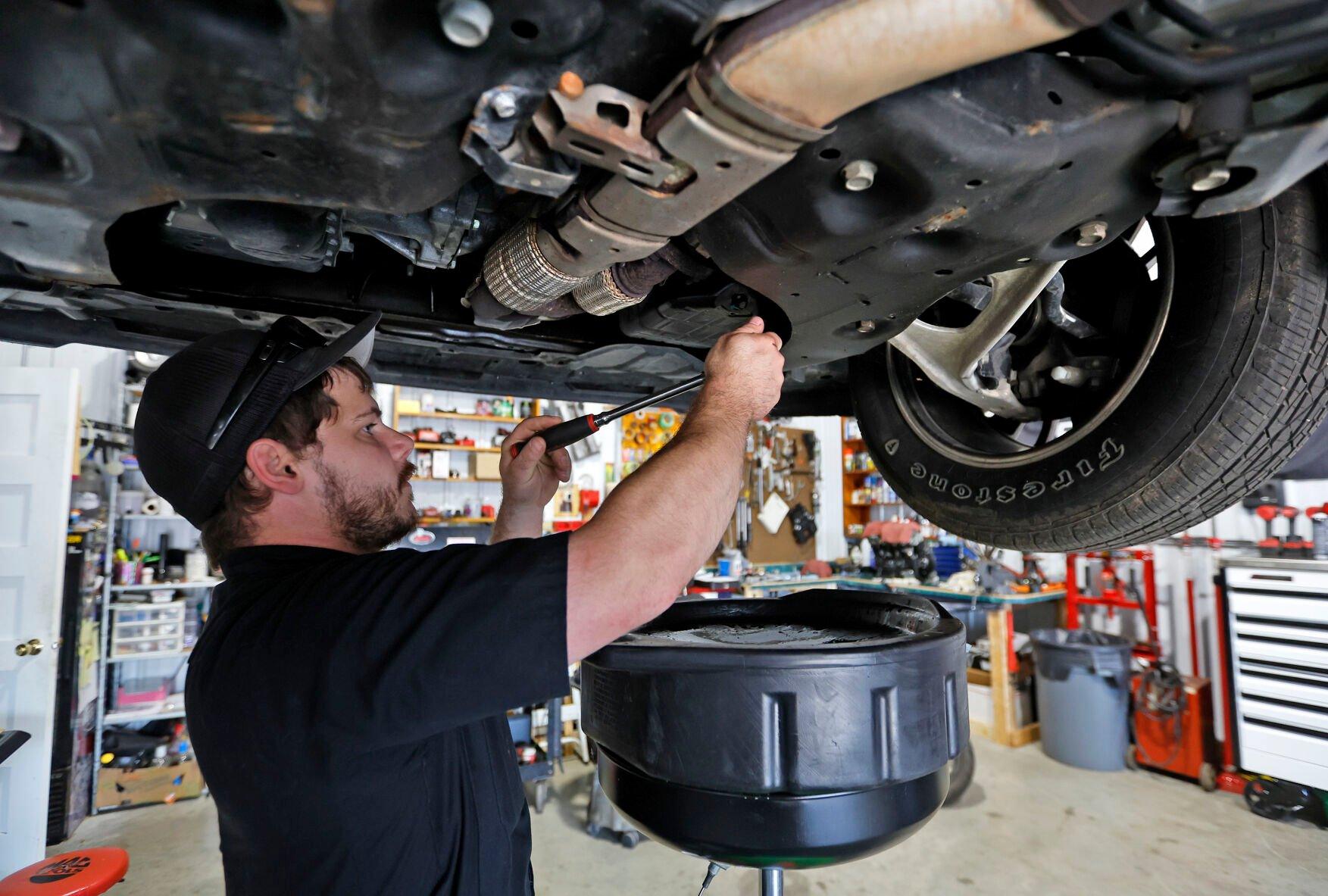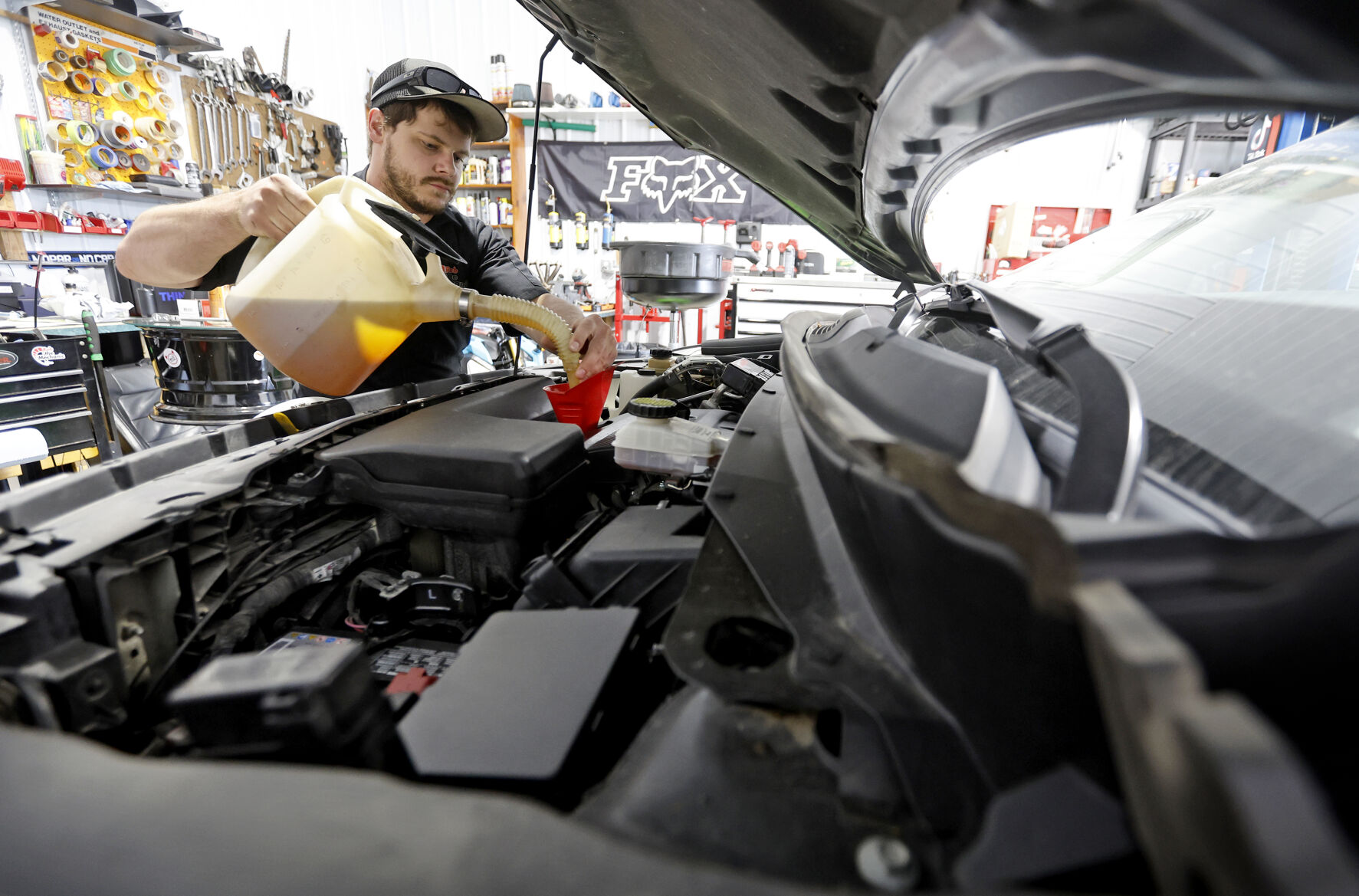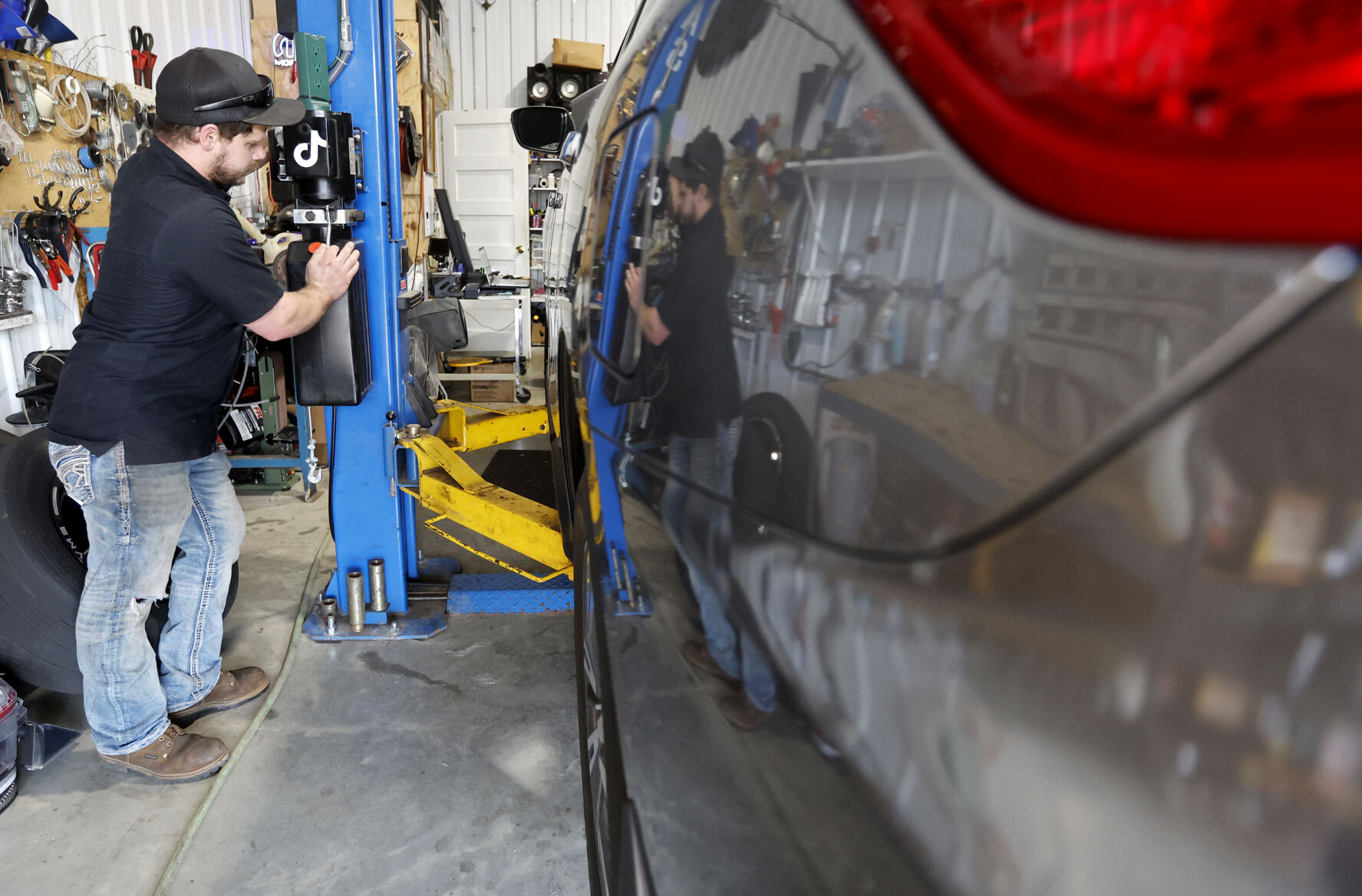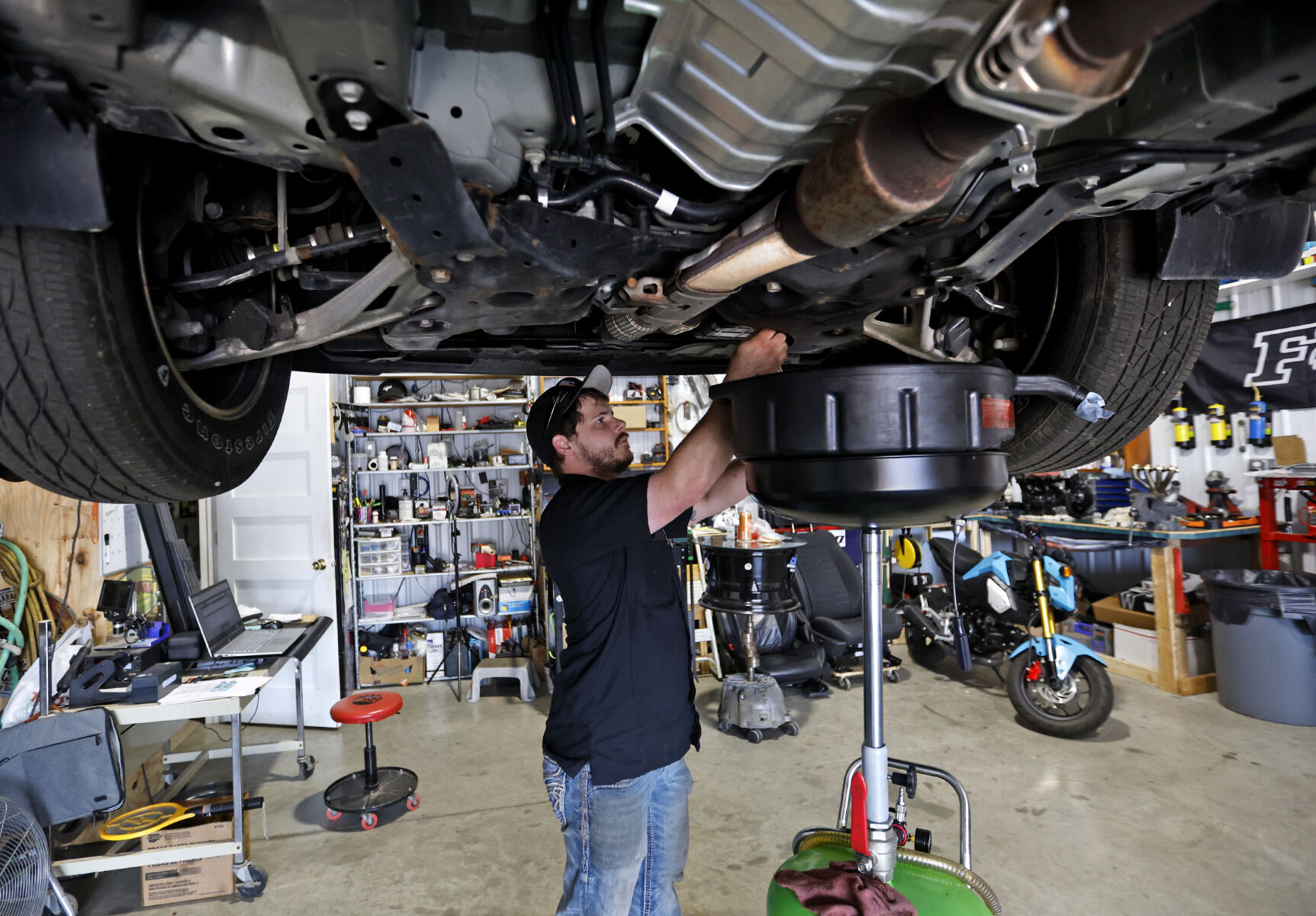Local mechanics say performing basic vehicle maintenance can extend a vehicle’s lifespan, and most motorists can do it themselves with little or no trouble.
But, if a larger problem arises, they should bring the vehicle to a shop as soon as possible.
“If your vehicle starts making any kind of noise, as soon as something has changed, you should take it into a shop,” said Robert Zeromski, a Dubuque mechanic known as Rob the Mechanic by his large social media following. “The sooner you catch it, the odds are it’ll be a cheap fix. If you keep driving with it more, it’ll be more expensive. I see it all the time. Someone might have something that’s a $50 fix, but they think, ‘Oh I’ll get it in a few weeks,’ and they keep driving. Then it turns into a $500 fix.”
Matt Swartz, owner of Vaughn’s Automotive on University Avenue in Dubuque, said one of the biggest things he encourages people to do is check their fluids, especially oil.
“A lot of people come in, they don’t have oil even touching the dipstick,” he said. “That can eventually cause catastrophic failure of your engine.”
Swartz said mechanics should check the oil when servicing a vehicle, and people who don’t know how to check it themselves should ask for a tutorial.
When checking oil, the vehicle must be parked on a flat, level surface with the engine turned off. Taking out the dipstick once, cleaning it, and then putting it back in the oil will get an accurate reading.
“It’s not a bad idea when you get your oil changed to have (mechanics) run through all the lights with you,” Swartz added. “How many times are you going to know your brake light is out if somebody doesn’t tell you?”
Zeromski, whose shop is on Cedar Crest Court, said the most important thing a vehicle owner should do is get their oil changed on time. Depending on the manufacturer, vehicles should have an oil change every 3,000 to 5,000 miles.
“As synthetic oils are coming out, oil change intervals are tending to get longer and longer,” he added. “Some new vehicles can go 5,000 to 10,000 miles (before needing an oil change), but the standard with conventional oil is 3,000 to 5,000.”
Swartz said oil changes are a good time to also check a car’s battery.
“A lot of people have corroded car batteries,” he said. “At the terminals where your battery cables connect to the battery, they can get a big build up of corrosion and gunk on them. It can eat away at the terminals and cables, and sooner or later, your car is not going to start someday.”
Zeromski said vehicle owners should also keep track of their tires, which should be rotated about every three oil changes. Moving the position of the tires ensures they will wear evenly and last longer.
“Tires have wear bars on them,” Zeromski said. “It’s the little raised part of rubber in the middle of your tread. Once the tire wears down to the point that little bar is flush with the rest of the tire, it’s time to get them replaced.”
Swartz shared a “penny trick” motorists can use to check if their tires need to be replaced.
“Stick (the penny) down in the tread depth with Lincoln’s head upside down,” he said. “If you can see the top of Lincoln’s head, your tires are completely worn out. If the head is covered by the tires, they still have some life left in them.”
Swartz also stressed the need to make sure tire pressures are correct, as having too high or too low pressure could wear tires incorrectly. He encouraged people to use digital air pumps that will read the tire’s pressure.
“A lot of people don’t have (tire pressure) gauges,” he said. “They go to a gas station and pump it up until it looks good. Then, they come in here, and the pressure is 85 pounds when it’s supposed to have 30 for it.”
Swartz also recommended having mechanics check brakes when they rotate tires, so drivers can then get an estimate of how long it will be until the brakes need to be replaced.
“Brakes do have squealers on them,” he said. “They’re metal clips. When the breaks do get down low enough, they squeal, and it’s kind of like an alarm that you need brakes. People will be like, ‘Oh, my brakes are just squealing,’ but then they start to grid, metal on metal. That can cause unnecessary damage that could’ve been avoided if you’d gotten it taken care of when they started squealing.”
Swartz also said people do not have to immediately panic when their check-engine light comes on, so long as the vehicle is running fine.
“If (the car) is missing or sputtering, then it’s a really urgent deal and you need to get in right away,” he said. “If the engine light is ever flashing, you really need to get it in right away. But otherwise, it can be something as simple as the gas cap being loose after you got gas.”
Zeromski said one thing many people don’t know about is the need to replace the air filter inside of a vehicle, which can affect the heating and cooling system.
“I’ve replaced quite a few of those recently that were just completely plugged up with dirt and grime,” he said. “The blower wasn’t even blowing hard out of the vents. As soon as I see the blower on high and not coming out of the vents like it should be, the first thing I do is go to the cabin filter, and nine times out of 10 it’s plugged up.”
He said the filter can typically be found behind the glovebox and encouraged people to check it, especially during hot summer months. He added that not replacing the filter could potentially wear out the blower as well, causing more problems down the line.
If a driver does have to take a vehicle into a shop, Zeromski recommends going to two or three places to have different people look at the vehicle and provide repair estimates.
“I see people get an estimate at one place, and they say, ‘OK,’ and it ends up not being that,” he said. “They still have the problem. You should go to at least two or three different shops and make a decision based off of that.”





